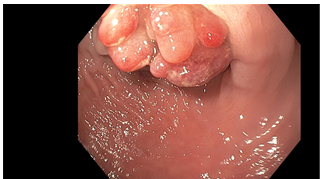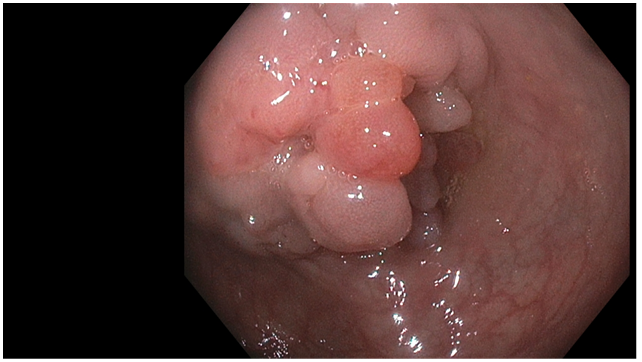Tuesday Poster Session
Category: Colon
P4660 - Rectosigmoid Endometriosis Masquerading as Colon Cancer
Tuesday, October 28, 2025
10:30 AM - 4:00 PM PDT
Location: Exhibit Hall

Rohan Tripathi, MD
Saint Louis University School of Medicine
Saint Louis, MO
Presenting Author(s)
Rohan Tripathi, MD, Neel Matiwala, MD, Pradeep Yarra, MD, Alfred Nelson, MD
Saint Louis University School of Medicine, Saint Louis, MO
Introduction: Endometriosis is a chronic neuroinflammatory condition caused by the growth of endometrial-like tissue outside of the uterus. Symptomatic Rectosigmoid endometriosis is rare, specifically with deeper mucosal infiltration and rectal bleeding. We present a case of rectal endometriosis in a patient with a history of IBS and multiple red-flag signs, symptoms and family history of colorectal cancer.
Case Description/
Methods: 39-year-old female patient with a past medical history of uterine fibroids, endometriosis status post total laparoscopic hysterectomy one year ago presented to clinic for evaluation of IBS-C. Patient had complains of abdominal pain that was relieved with bowel movements with initial diarrhea predominance and now constipation. She has one bowel movement per week and uses dicyclomine. Upon further review of systems, the patient was additionally found to have rectal bleeding, unintentional weight loss of 5-10 pounds, nocturnal diarrhea, and family history of colorectal cancer. Colonoscopy three years ago was normal but lab values reveal iron deficiency anemia with a low ferritin of 18. Colonoscopy revealed a frond-like villous and polypoid non-circumferential 20mm partially obstructing mass in the recto-sigmoid colon, about 15cm from the anal verge. Initial biopsies were not conclusive but showing reactive changes like dilated and irregular crypts with fibrotic stroma. Subsequently, imaging redemonstrated 2.6cm soft tissue density within the sigmoid colon. Flexible sigmoidoscopy showed Paris IIa, Kudo pit pattern IIIL on advanced imaging. Repeat biopsies showed spindled stroma; immunostaining for estrogen receptor is positive, consistent with endometriosis. Patient was referred for multidisciplinary care with surgery and gynecology.
Discussion: Diagnosis of Rectosigmoid endometriosis remains difficult due to its shared signs and symptoms with gastrointestinal diseases, specifically in younger women. Radiological imaging is supportive, but endoscopic procedures like colonoscopy or endoscopic ultrasound with biopsies have diagnostic value. Surgical treatment is considered in symptomatic patients with invasive intestinal compromise, or for patients with progressive lesions, and impaired sexual function.

Figure: Endoscopic view of rectosigmoid mass

Figure: Polypoid, frond like villous partially obstructing mass
Disclosures:
Rohan Tripathi indicated no relevant financial relationships.
Neel Matiwala indicated no relevant financial relationships.
Pradeep Yarra indicated no relevant financial relationships.
Alfred Nelson indicated no relevant financial relationships.
Rohan Tripathi, MD, Neel Matiwala, MD, Pradeep Yarra, MD, Alfred Nelson, MD. P4660 - Rectosigmoid Endometriosis Masquerading as Colon Cancer, ACG 2025 Annual Scientific Meeting Abstracts. Phoenix, AZ: American College of Gastroenterology.
Saint Louis University School of Medicine, Saint Louis, MO
Introduction: Endometriosis is a chronic neuroinflammatory condition caused by the growth of endometrial-like tissue outside of the uterus. Symptomatic Rectosigmoid endometriosis is rare, specifically with deeper mucosal infiltration and rectal bleeding. We present a case of rectal endometriosis in a patient with a history of IBS and multiple red-flag signs, symptoms and family history of colorectal cancer.
Case Description/
Methods: 39-year-old female patient with a past medical history of uterine fibroids, endometriosis status post total laparoscopic hysterectomy one year ago presented to clinic for evaluation of IBS-C. Patient had complains of abdominal pain that was relieved with bowel movements with initial diarrhea predominance and now constipation. She has one bowel movement per week and uses dicyclomine. Upon further review of systems, the patient was additionally found to have rectal bleeding, unintentional weight loss of 5-10 pounds, nocturnal diarrhea, and family history of colorectal cancer. Colonoscopy three years ago was normal but lab values reveal iron deficiency anemia with a low ferritin of 18. Colonoscopy revealed a frond-like villous and polypoid non-circumferential 20mm partially obstructing mass in the recto-sigmoid colon, about 15cm from the anal verge. Initial biopsies were not conclusive but showing reactive changes like dilated and irregular crypts with fibrotic stroma. Subsequently, imaging redemonstrated 2.6cm soft tissue density within the sigmoid colon. Flexible sigmoidoscopy showed Paris IIa, Kudo pit pattern IIIL on advanced imaging. Repeat biopsies showed spindled stroma; immunostaining for estrogen receptor is positive, consistent with endometriosis. Patient was referred for multidisciplinary care with surgery and gynecology.
Discussion: Diagnosis of Rectosigmoid endometriosis remains difficult due to its shared signs and symptoms with gastrointestinal diseases, specifically in younger women. Radiological imaging is supportive, but endoscopic procedures like colonoscopy or endoscopic ultrasound with biopsies have diagnostic value. Surgical treatment is considered in symptomatic patients with invasive intestinal compromise, or for patients with progressive lesions, and impaired sexual function.

Figure: Endoscopic view of rectosigmoid mass

Figure: Polypoid, frond like villous partially obstructing mass
Disclosures:
Rohan Tripathi indicated no relevant financial relationships.
Neel Matiwala indicated no relevant financial relationships.
Pradeep Yarra indicated no relevant financial relationships.
Alfred Nelson indicated no relevant financial relationships.
Rohan Tripathi, MD, Neel Matiwala, MD, Pradeep Yarra, MD, Alfred Nelson, MD. P4660 - Rectosigmoid Endometriosis Masquerading as Colon Cancer, ACG 2025 Annual Scientific Meeting Abstracts. Phoenix, AZ: American College of Gastroenterology.
